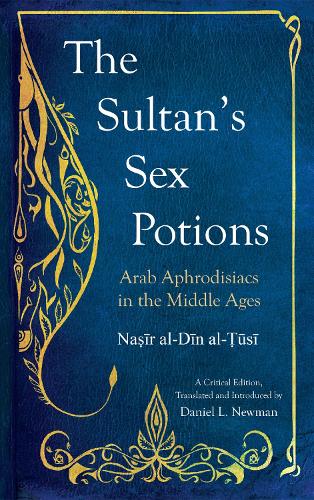
The Sultan's Sex Potions: Arab Aphrodisiacs in the Middle Ages
(Paperback, New edition)
Publishing Details
The Sultan's Sex Potions: Arab Aphrodisiacs in the Middle Ages
By (Author) Daniel L. Newman
By (author) Nasir al-Din al-Tusi
Translated by Daniel L. Newman
Saqi Books
Saqi Books
11th February 2026
28th August 2025
New edition
United Kingdom
Classifications
General
Non Fiction
Literary studies: ancient, classical and medieval
Sex and sexuality, social aspects
892.783408
Physical Properties
Paperback
288
Width 135mm, Height 216mm, Spine 30mm
300g
Description
Arabic erotic literature has a long and rich history, which goes back as far as the ninth century. Far from being the pursuit of prurient pornographers, eroticism and sexuality received considerable attention from scholars.
Written by Nasir al-Din al-Tusi (1201 - 1274), one of the leading scientists of the age, The Sultan's Sex Potions is part of a relatively small group of works devoted to aphrodisiacs, as well as sexual stimulants, sexual practices and positions. Sober and measured in tone, the work was intended to be a manual, which would allow the patient to dispense with the services of a physician. Written at the request of the ruler, its potions, electuaries, syrups and enemas enjoyed a 'royal warrant of appointment' to arouse the lust for coitus and enhance sexual potency.
This bilingual volume includes a critical edition of three manuscripts (Berlin, Cairo and Glasgow) and is accompanied by a translation, as well as an introduction to Arabic erotic literature, a biography of the author and extensive indexes.
Reviews
'Provides a much-needed, compact guide to the genre ... generally serious in tone, but also rather amusing ... accessible and inviting to both specialists and non-specialist readers.' --School of Abbasid Studies
Author Bio
Nasir al-Din al-Tusi (1201 - 1274) was a Persian polymath and prolific writer,who built up a huge oeuvre (in excess of 150 works in both Arabic and Persian), covering a large number of fields, including mathematics, geometry, mineralogy, astronomy, medicine, philosophy and theology. He also re-edited and wrote commentaries on Greek and Arabic mathematical works, which became crucial resources in the spread of the Greek sciences in the Muslim world. He was of the Ismaili and subsequently Twelver Shia Islamic belief. The Muslim scholar Ibn Khaldun (1332 - 1406) considered Tusi to be the greatest of the later Persian scholars. Daniel L. Newman is Head of the Arabic Studies Department, Professor of Arabic and Course Director of the MA in Arabic - English Translation and Interpreting at the University of Durham, UK.
